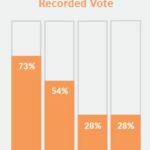Fighting words to a member of the State Senate: “Left in Appropriations.” That phrase appears at the abrupt end of the bill history for so many pieces of Senate legislation (and plenty of House bills, too.) See for yourself – it is quite a list. All bills died with adjournment Sunday.
I went looking there recently for the fate of Senator Bill Carrico’s proposal to set up an elective course with credit on the Bible in Virginia public schools. Such a course was bound to prove a lightning rod, but that collection of books and the history around them is at the heart of Western Civilization. The growing level of ignorance is appalling. I was all for that idea, which was “Left in Appropriations.”
David Poole and his team at the Virginia Public Access, Project have once again developed worthwhile graphics scoring the legislative outcomes. The concern is not that too many bills fail, but that too many pass. Too many are introduced in the first place. A helpful, efficient staff of lawyers is willing to write any hare-brained idea into a bill, so bills proliferate.
If you want to change behavior, start to measure it and highlight it. The decline in bills dying with no recorded vote at all is huge, as we can see now that VPAP is tracking results annually. People rail against so many bills being snuffed in a subcommittee rather than full committee, but now more of those votes are at least recorded.
If you think changing the leadership to the Other Party will eliminate that practice, think again. If a bill is introduced simply for the purpose of forcing a politically-useful wedge vote, by either party, that targeted party is justified in putting the bill in a drawer. One can only imagine what was found in his desk when the late, great House Courts Committee Chair Hardaway Marks retired. “We’ll let you know,” he would say, smiling at many a patron who asked about the fate of his or her bill.
Formally streaming and recording more subcommittee meetings is the next reform, and with the equipment getting so cheap that will likely occur soon. It still blows me away to realize that I can go back and view committee and floor sessions at leisure. No question, the presence of cameras has greatly changed the process. It has also lowered their entertainment value.
The humor of decades past is gone, or largely muted It was often politically incorrect. Hopewell’s Riley Ingram had the House roaring with laughter with his retirement speech (streamed, of course) last week, but there were stories I know he left out. One I will only hint at: a wisecrack made openly on the House floor (not by him) during debate on a bill involving fox hunting with dogs. (What you imagine is probably worse than what was said but enjoy your imagination.)
A similar wisecrack about a bill taking the fun out of drinking and driving helped end the career of a state senator, and he was not on video saying it. We have paid a price for the new transparency. Eggshells and landmines are everywhere you step, as we’ve demonstrated again this past four weeks.
Daily House and Senate floor sessions are now substantially lengthened by “Point of Personal Privilege” speeches which were rare in the days before the never-blinking cameras appeared. Now they are up on social media before the daily calendar is complete.
It may be time to borrow another practice from Congress and allow members onto the floor when nobody else is there to declaim on the record to their heart’s content, wasting nobody’s time but their own.
The legislative process and our legislators take a fair amount of abuse, some of it deserved, but over time it has become far more open, accessible and accountable. Further progress is possible, imperative in the realm of lobbyist reporting, but it will happen only if we continue to push and complain.




